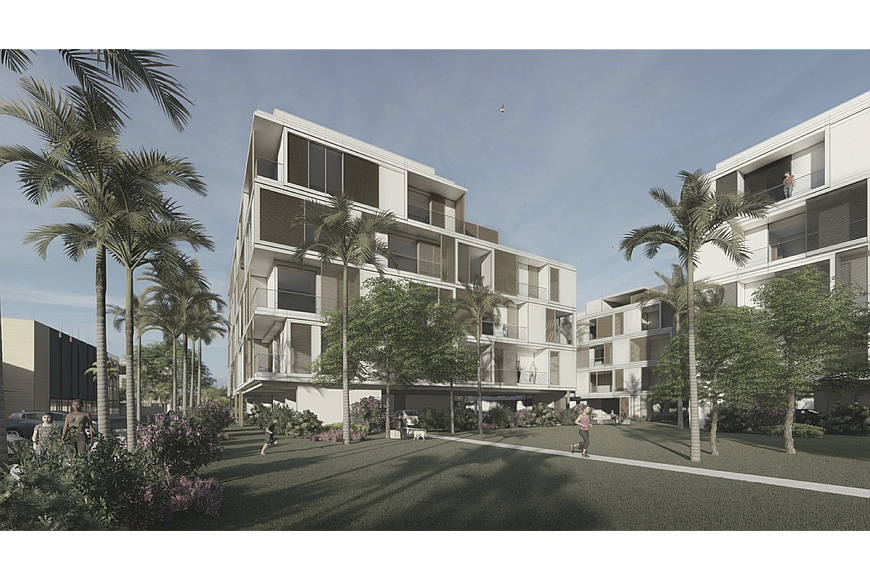- November 30, 2024
-
-
Loading

Loading

At Monday’s City Commission meeting, the owners of the Bath & Racquet Fitness Club failed to secure the support necessary to move forward with plans for a residential redevelopment of the property, bringing a close to a contentious planning process that had been ongoing for more than two years.
In a 3-2 vote, a majority of the commission voted in favor of advancing a proposed comprehensive plan amendment to change the future land use designation of the Bath & Racquet Club site, located at 2170 Robinhood St. But because a comprehensive plan amendment requires supermajority support to pass, the board rejected the change, leaving current regulations in place and rendering a proposed site plan unbuildable.
The Bath & Racquet Club hoped to build up to 207 residential units, 15% of which would be designated as affordable, in three-to-five-story buildings on the perimeter of the 13.5-acre site. Representatives for the property owners said the redevelopment was necessary to create an infusion of revenue ensuring the fitness center could remain in operation and undergo renovations.
The public hearing on the proposed amendment, which lasted more than four hours, highlighted a number of divides. More than 35 members of the public signed up to speak, the majority of whom opposed the project and felt the plans were incompatible with the surrounding area, located southeast of U.S. 41 and Bee Ridge Road. Residents living in single-family homes near the project site expressed concerns about the number of units proposed, the project’s impact on traffic and the height of the buildings.
“We’ll be living in their shadows,” resident James Guttridge said. “They’ll be looking from great heights, 60 feet away, into our swimming pools, living rooms and bedrooms, completely removing all privacy that we have had.”
But more than a dozen speakers said they supported the proposal, expressing a desire to support the Bath & Racquet Club and arguing a multifamily residential project was appropriate near a major commercial corridor.
“Compatibility does not mean ‘the same thing,’” said Gene Boles, a club member and former director of the Hillsborough County planning department. “If it did, everything would be uniform. We must transition and step down.”
The commission got conflicting advice on whether to approve the proposed redevelopment. The city’s Planning Board voted 3-2 to recommend denying the proposal, with a majority sharing residents’ concerns about the compatibility of the project and the density of the proposed redevelopment. City planning staff recommended approving the proposal, stating the plans were consistent, on balance, with the city’s planning priorities and would provide a public benefit.
And, when it came time to vote, the proposal divided the commission. Mayor Jen Ahearn-Koch said she believed it was inappropriate to build medium-density mid-rise housing adjacent to some single-family areas. Ahearn-Koch and Commissioner Willie Shaw cast votes against advancing the comprehensive plan change.
“I do not believe that it is in any way shape or form compatible with our neighborhood chapter,” Ahearn-Koch said.
Commissioner Hagen Brody spoke positively about the proposal. Commissioner Liz Alpert repeatedly pointed to planning staff’s statement the comprehensive plan change would create a less intense development potential on the site than the existing land use designation allows. Commissioner Shelli Freeland Eddie joined Brody and Alpert in supporting the amendment.
Ahead of the vote, Alpert noted the Bath & Racquet Club had been working since 2017 on the proposal, holding a number of voluntary meetings with residents and scaling down the plans in response to strong neighborhood pushback. Alpert said even if the comprehensive plan amendment advanced, the city would still need to take another vote to officially adopt it, and the commission would hold another public hearing on the specifics of the proposed site plan for the redevelopment. She asked the commission to acknowledge the effort that had been put into the planning process by not outright rejecting the proposal Monday.
After her appeal failed to garner the necessary support for the amendment, Alpert offered a pessimistic assessment of the city’s development review procedures.
“I think people should never bother to go and work with the neighborhoods,” Alpert said.